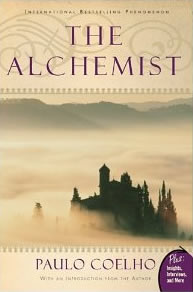Book Notes
 Paulo Coelho, The Alchemist (New York: HarperCollins, 1998 edition), 197pp.
Paulo Coelho, The Alchemist (New York: HarperCollins, 1998 edition), 197pp.
The Brazilian Paulo Coelho (b. 1947) always dreamed about being a writer. His parents had other plans. When he persisted in pursuing his dream, his parents committed him to a mental institution. After a year of law school, bouncing around as a hippie, and a stint as a successful executive in the music industry, Coelho had a vision of a stranger, which stranger he met two months later in a cafe. At the encouragement of the stranger, in 1986 Coelho walked the 500-mile medieval pilgrim route called the Road of Santiago de Compostela. Two years later, he wrote The Alchemist (1988), but when the first edition sold only nine hundred copies, the publisher decided not to reprint it. Today, Coelho has written thirty books that have sold over 100 million copies, been translated into 70 languages, and sold in 150 countries.
With 65 million copies sold, The Alchemist is one of the best selling books in publishing history. It's a simple fable about a shepherd boy named Santiago, who follows a recurring dream about finding buried treasure in the pyramids of Egypt. He refuses to live "only for bread and water," which is what his sheep and even his father do. He rejects "the world's greatest lie" that we have no control over our lives and are consigned to fate. Rather, Santiago chooses to discover his own "Personal Legend," and so he sets off for the pyramids. He meets many interesting characters — a king named Melchizedek, a gypsy woman, a thief, a crystal merchant, an Englishman, Fatima, and, finally, an alchemist. There are obstacles aplenty — the fear of mistakes, risk aversion, self-pity, following someone else's dream, feeling like it's too late to change, and even the fear of success. But Santiago perseveres and reaches his destination, although it's not the one he anticipated.
There's a sense in which The Alchemist feels rather hokey. It's message might be summarized in simplistic cliches — to thine own self be true, follow your heart, live your dream, and don't die with the music left inside of you. This isn't great literature. But it has spoken to 65 million readers, so it's fascinating to ask why. When asked about its success, Coelho says, "we all need to be aware of our personal calling." But most of us are thwarted by four main obstacles: we're told our dream is impossible, we fear betraying the people we love, defeats discourage us, and we fear success. There's a "universal language of human longing," says Coelho, and so he writes to help his readers "disinter their dreams."


